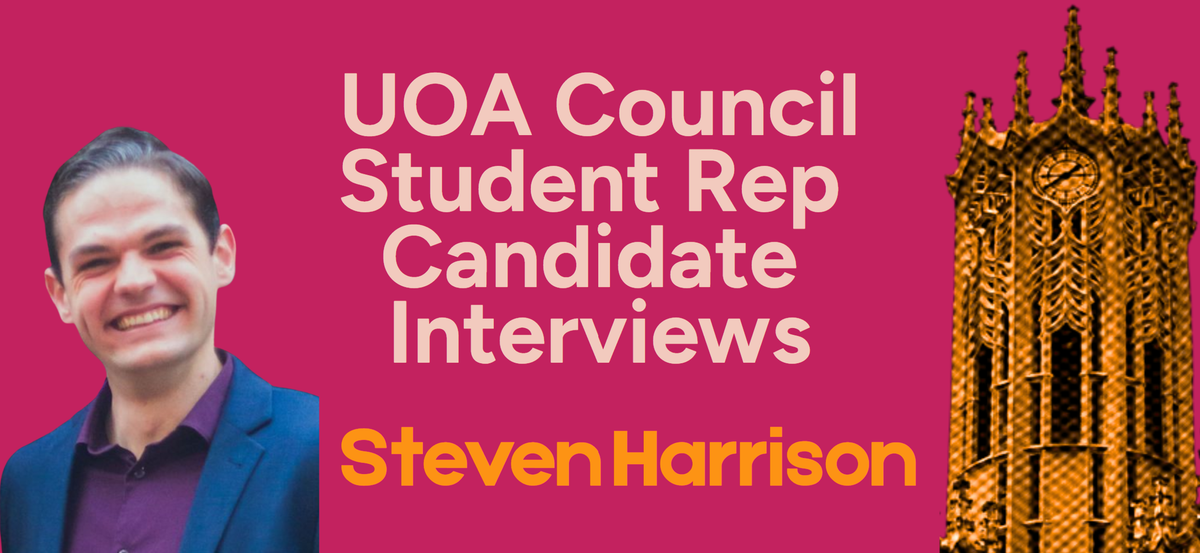Interview with Steven Harrison | UOA Council Student Rep Candidate
Interview with Steven Harrison | Vote now in the University Council Student Rep Elections!

University Council Student Rep Elections are on NOW! Vote here! Elections close at 12 pm on Tuesday, 14 October. Check out interviews with some of the other candidates on our website. More on the elections can be found here.
What are you studying at UOA? What’s been your most rewarding and most challenging paper, and what did you learn from each?
I’m currently studying medicine! It’s an incredibly demanding degree, but also one of the most rewarding. The impact you can have on people’s lives is remarkable!
Unlike many other degrees, medicine doesn’t have designated papers but instead modules that focus on different organ systems. The most rewarding and, at the same time, the most challenging, was my very first module on the musculoskeletal system. It really was a baptism by fire: content coming thick and fast, the pressure of a brand-new learning environment, relearning how to learn, and the feeling of never fully “finishing” a topic.
As someone who’s naturally meticulous, it was a difficult adjustment. But that’s exactly what made it so rewarding. I had to completely reframe the way I learned – shifting from memorising facts to truly understanding concepts, and doing so in a way that allowed me to retain knowledge for the long term. That module was tough, but it lit a fire in me for science and understanding that still drives me over two years later. The lessons I learned then – resilience, adaptability, and curiosity – are lessons I carry with me not just in my studies, but in every role I take on.
Will you remain enrolled and available to serve the full two-year term?
Yes! I will be fully enrolled and available to serve the entire two-year term. To me, that’s not just a formality. Two years means enough time to build trust, follow through on student concerns, and make meaningful change rather than quick fixes. I’m committed to seeing this role through from start to finish, so that student voices are not only heard, but acted on.
What should a University’s role be in providing for students' academic and cultural pursuits?
A university should be more than a place where you sit exams and earn a degree. Its role is to give students the tools, opportunities, and support to grow both academically and culturally, because the two are inseparable.
On the academic side, the University must provide teaching that challenges us, research that inspires us, and support systems that help us succeed no matter our background. That means making learning accessible, fair, and relevant to the world we’ll step into.
But just as importantly, the University has a responsibility to create space for cultural expression and community. Students thrive when they feel like they belong. That means supporting cultural groups, celebrating diversity, and recognising Te Tiriti o Waitangi as a living commitment, not a token gesture. For many of us, the friendships, clubs, cultural events, and advocacy work we do here shape us as much as the classroom learning.
To me, the University’s role is clear: to make sure that every student, regardless of ethnicity, gender, or socioeconomic background, feels that they have the freedom to learn, the safety to express themselves, and the platform to be heard. If we get that right, then the University isn’t just producing graduates. It’s shaping leaders, thinkers, and communities that reflect the best of who we are.
Have you reviewed UOA’s 2026 CSSF budget? Are there any changes you would advocate for?
The CSSF budget represents one of the most important tools we have to directly improve student life. At over $48 million, it’s vital that this money is spent in ways that reflect both student needs and student voices. While all the categories are important, I believe we need to prioritise services that impact students’ day-to-day wellbeing and ability to thrive: things like counselling, health services, and financial support.
At the same time, we’ve seen first-hand the consequences of underfunding student media and cultural outlets, with Craccum facing reduced financial capacity and Ubiq closing its doors. These may seem like smaller line items compared to sport or recreation, but they are essential for fostering culture, holding institutions accountable, and ensuring students are informed and connected.
I wouldn’t advocate for cutting one group’s support to fund another – that risks dividing students against each other. Instead, I would push for greater transparency, consultation, and efficiency in how the levy is managed, and I would fight to protect areas that are currently vulnerable, like student media and affordable childcare. With a budget of this size, we should be able to strengthen core services without leaving important voices behind.
If elected, how will you stay visible, accessible, and responsive?
If elected, I want students to feel that their voice doesn’t just end at the classroom door – it should be carried right through to the Council table. Staying visible and accessible means more than sending the occasional email. It means creating genuine two-way communication.
Practically, I would commit to:
· Regular drop-in sessions (both in-person and online) where students can raise concerns directly.
· Active use of class pages and social media to share updates, seek feedback, and be transparent about decisions being made.
· Targeted outreach to underrepresented groups – ensuring that students from diverse backgrounds, cultural communities, and study pathways feel their experiences are heard.
· Quick response times – if a student reaches out, they should expect a reply and clear follow-up.
At Council, my role is to not only bring concerns forward but to amplify them effectively. That means translating student stories into language that resonates with decision-makers, and reporting back on outcomes so students know their voices made an impact. I want to be a rep who isn’t just visible at election time, but consistently present, approachable, and accountable throughout the full two-year term.
How do you stay up-to-date with everything that’s going on at the University?
I make it a priority to stay connected on multiple levels. On the formal side, I keep up-to-date with University communications, faculty updates, and official policy changes so I know what’s happening at the governance level.
Equally important though, I stay tuned in to the student voice by being active in class Facebook pages, group chats, and through my role as a current Class Rep. That role has taught me the value of being approachable and hearing what students are really experiencing day-to-day – the things that don’t always make it into official reports.
I also make a point of talking with student clubs, cultural groups, and peers across different faculties to understand how issues play out in different contexts. It’s that mix – knowing what’s coming down from the top, and what’s bubbling up from the ground – that ensures I’m always aware of the bigger picture and able to represent students authentically at the Council table.
Which University Council committee would you most want to follow closely?
If elected, the committee I’d want to follow most closely is the University Equity Leadership Committee. For me, equity isn’t a side issue – it’s at the core of student experience. Whether it’s financial hardship, accessibility, cultural safety, or support for under-represented groups, these are the issues that shape whether students can truly succeed at university.
I’ve seen first-hand, through my medical training and through being a class representative, how much inequity still exists – from barriers to accessing support services, to the cultural and financial pressures that weigh heavily on some of our peers. Following the Equity Leadership Committee closely would give me the opportunity to ensure that students’ concerns around fairness, inclusion, and support are not just discussed but acted on.
Alongside that, I’d also take a keen interest in the Student Appeals Committee, because it speaks directly to the question of fairness in how rules are applied. For many students, the appeals process can be intimidating and stressful, and I believe having a student representative closely engaged in that space matters hugely for trust and accountability.
In 50 words or fewer, what makes you stand out?
Seven previous rep roles, two faculties, one mission: making sure students are heard at the very top. I’ve spent years fighting for fairer assessments, better support, and stronger teaching. I know how to deliver change. Eighteen candidates will promise to listen. I’ll go further – I’ll act.





